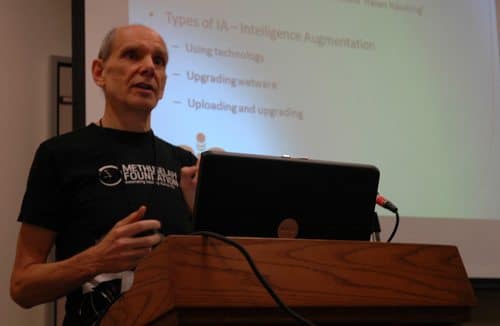
Peter Voss was blessed with a ten-year sabbatical. Not from academia, but from business.
After listing his first commercial software company on the Johannesburg Stock Exchange (he lived in South Africa at the time), Peter sold it, and the next ten years were dedicated to learning about… learning.
Well, “intelligence,” really, and how it is understood, applied, and coded.
Aiming to innovate and apply artificial general intelligence, Peter studies everything from ethics to psychology to politics, familiarizing himself with every body of knowledge that would help in his new quest.
After ten years of study, Peter came back to the business world and started Adaptive AI. It took five years to get off the ground after building an intelligence engine with his team and researchers, but the company now successfully helps companies automate phone services more effectively and intuitively. Peter says “The way I usually explain it is this – you know how when you call a company and get a computer on the other line and hate it? Well… we’ll have you hate it less.”
So of course now Peter should be furthering AGI by applying his intelligence engine out in the world, right?
Business is supposed to promote innovation, right?
Some technologies and best build upon and furthered “in the field.” A new blogging platform, and ecommerce software, or a baby stroller can all be tweaked and adjusted to better fit the market and needs when they’re actually in the hands of customers / users.
Peter believes that AGI is a different story. “Hardcoding human knowledge intot he system is always quicker and cheaper to get good results, so what you end up doing is go away from generalities. There are tremendous commercial pressures to make your AI narrow… So it’s really hard to move AGI forward in a commercial environment.”
In this respect, it makes more sense for a real AI business to start narrow in order to get into a field, and stay narrow if they want to survive. This is why Peter has leveraged the success of Adaptive AI to fund his research and development company, AGI Innovations. In order to keep his innovations funded, he needs his narrow application to phone calls, but in order to expand and contribute to the AGI field, he needs a separate “lab” than the commercial business.
Luckily, Peter’s skill and determination have taken him far enough to stay involved in both research and in business, and his aspiration is to take the AGI insight and technologies he develops and bring them to market when it’s viable and time time is right. “Until you get close to human level intelligence, narrow applications are preferable and more effective,” Peter says.
When exactly “near-human” AGI will have viable applications in the market is a question that’s still up in the air. 18 months and 3 years are some time-frames that Peter chatted with me about, but there doesn’t seem to be any conclusive time-frames at present. We can assume Peter – and researchers like him worldwide – won’t be slowing down anytime soon.







